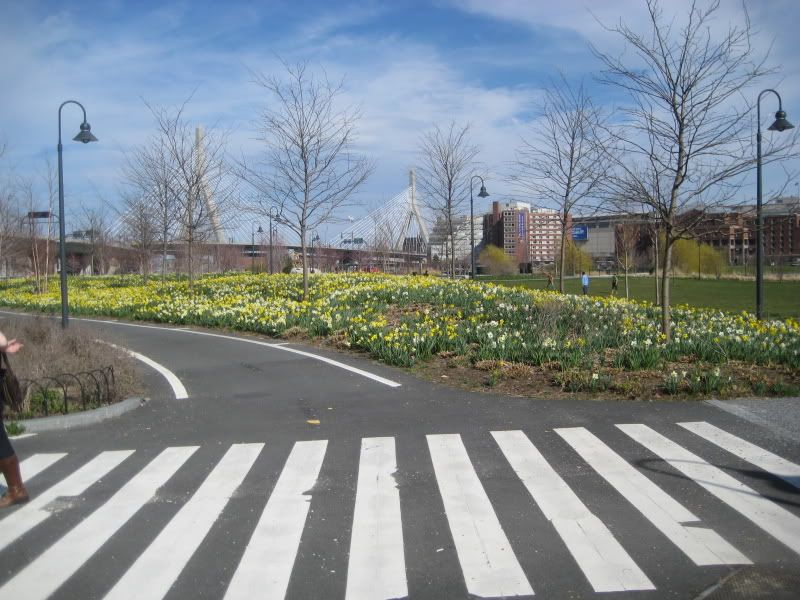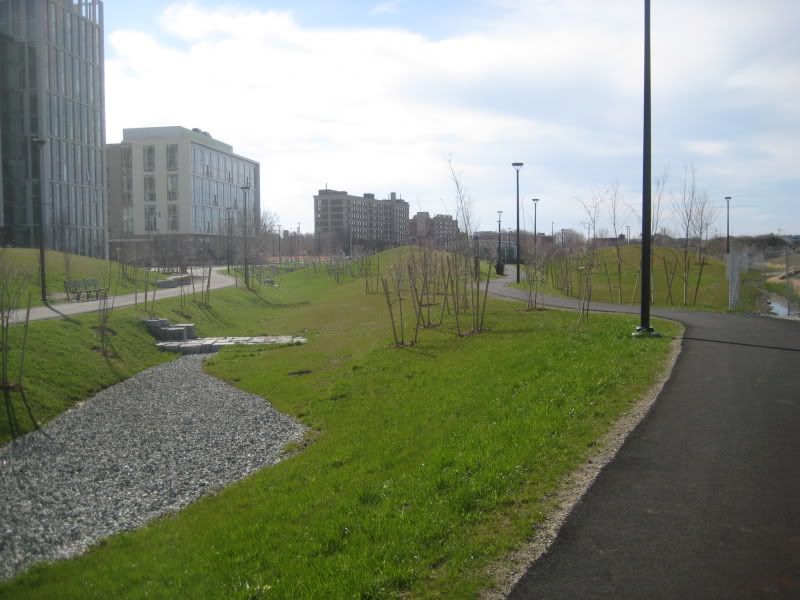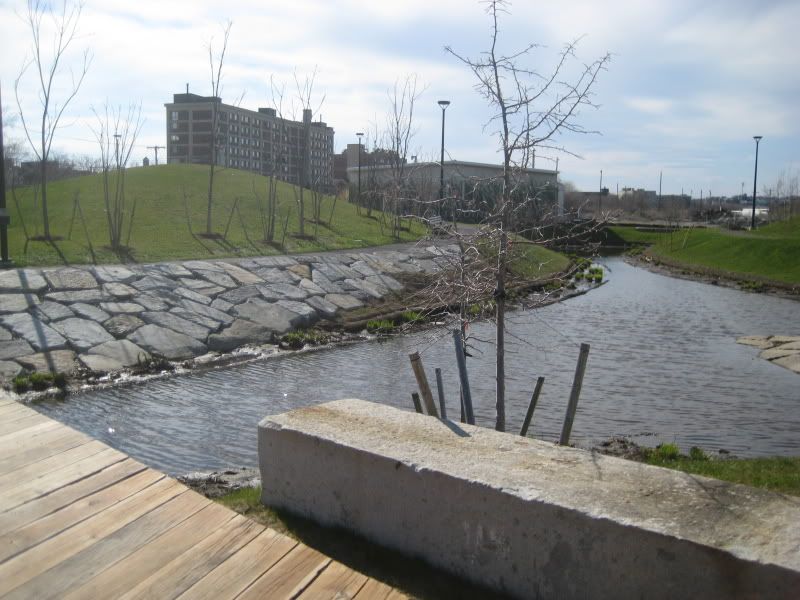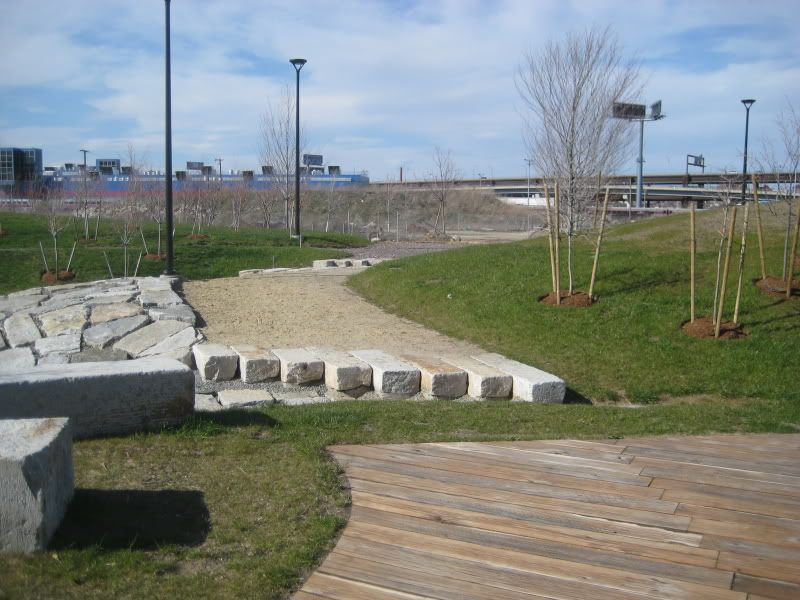Call It ?NoPoint?
New Lechmere Station Is The Least Of Troubled NorthPoint Project?s Woes
By Paul McMorrow
Banker & Tradesman Staff Writer
Forget that $70 million MBTA station. When it comes to building out Cambridge?s troubled NorthPoint project, relocating Lechmere Station won?t be the half of any developer?s worries. That?s because new internal documents show the public infrastructure tab on the project is a staggering $257 million.
Pan Am Railways and the NorthPoint Cambridge Land Co. (populated by former Spaulding & Slye executives), the developers of the 5 million-square-foot East Cambridge development, have tried and failed to unload their land and development rights twice since late 2007. Archon Group took a long look at the project in late 2007, for a price of $175 million, but ultimately backed out. Last December, Boston?s Berkeley Investments followed suit. In that case, the developers had an offer of $103 million on the table, but held out for Berkeley?s offer of $106.5 million.
In both cases, concern over the cost of the project?s massive infrastructure requirements helped derail a possible sale. (Prolonged legal wrangling over NorthPoint?s land titles hasn?t helped, either.)
Incredible Infrastructure Increase
Internal documents, obtained by Banker & Tradesman through a state public records request, shed new light onto the infrastructure liability NorthPoint?s developers are asking any new buyer to assume. Those liabilities continue to dampen the project?s price.
A November 2008 memo from a Berkeley consultant lays out total infrastructure costs that are more than twice the cost of rebuilding Lechmere Station ? a project that Pan Am and NorthPoint Cambridge had agreed to assume, and which state leaders are now vowing to pin on the developers? successors.
The Berkeley memo sketches out more than $257 million in infrastructure costs associated with the project; the new T station only accounts for $111 million of that sum. The rest of that tab consists of considerable work to Monsignor O?Brien Highway and First Street, new roads and utilities inside the project?s perimeter, parking, bonding fees and carrying costs. $20 million of this work has already been completed, but $237 million remains outstanding, and will become the responsibility of whichever developer eventually buys out Pan Am and NorthPoint Cambridge.
The development partnership?s best shot at unloading NorthPoint was to Archon. At the time of that proposed sale, the real estate markets were slowing, but capital markets and demand for new commercial construction had not yet collapsed. Notably, even at that point, the project?s infrastructure bill eclipsed its $175 million price tag. When Berkeley was studying the feasibility of its offer, costs associated with the Green Line topped the firm?s land acquisition costs, while the project?s total infrastructure costs more than doubled Berkeley?s land costs.
When real estate values were rocketing skyward, developers of large-scale projects could afford to foot public infrastructure costs, because they were essentially trading new public infrastructure for increased density. Increased density translated to drastically increased profits. The calculus was a boon to both developers and local officials, who enjoyed new amenities without paying for their construction.
No Support
That math doesn?t work anymore. The few developers who are still pushing ahead with new construction are doing so with drastically increased equity requirements and steeper borrowing costs. Falling residential values and commercial rents have taken huge chunks out of their margins. Higher costs and lower earnings, taken together, no longer support the private creation of public infrastructure.
But cash-strapped local officials have little ability to fund new infrastructure, either. As a result, they?re continuing to demand boom-time concessions. That?s why NorthPoint?s $237 million infrastructure bill is enough to scare any would-be developer. Construction and materials costs have fallen sharply in the past six months, but NorthPoint?s feuding owners are unlikely to sell for a price below $100 million. A sale will likely wait until commercial demand has returned. And demand?s return could very well drive up construction costs again.
It?s worth noting that NorthPoint?s infrastructure costs dwarf the costs of the local development projects that will be receiving federal stimulus infrastructure funding. The $1.5 billion Westwood Station project involves $73 million in public infrastructure improvements. Somerville?s Assembly Square project managers have asked state leaders for $33.7 million in infrastructure aid. At SouthField in Weymouth, the request stands at $57 million. Revere?s Waterfront Square has asked for $52 million. Two other projects, in downtown Lowell and Jackson Square, Roxbury, have not yet received the administration?s blessing, but are considered good candidates for stimulus funding; their infrastructure requests stand at $22 million and $7 million, respectively.
In Worcester, Berkeley Investments is pushing ahead with the first phase of its $550 million mixed-use CitySquare project. It?s able to proceed because public entities are fronting that project?s $94 million infrastructure bill.
Berkeley asked state officials to help them shoulder NorthPoint?s unwieldy infrastructure tab last November. The development firm sketched out a proposal in which the public would assume $134 million in NorthPoint?s infrastructure costs, including the work on the Green Line and the O?Brien Highway; the remaining $123 million would be funded through a public/private partnership, similar to the arrangement Berkeley is employing in Worcester. An administration official characterized the conversation as preliminary, adding that no further conversations occurred with Greg Bailecki, the state?s secretary of housing and economic development.
Extension Extinction?
NorthPoint?s troubles have set the relocation of the Green Line?s Lechmere Station back several years. That, in turn, has threatened the entirety of the $600 million Green Line extension to Somerville and Medford, which the state is legally mandated to complete by the end of 2014.
Development activity at NorthPoint has been at a halt since shortly after its first phase broke ground, in 2005. Its developers envisioned building a 5 million-square-foot mixed use mini-city, including 2.2 million square feet of commercial space, 150,000 square feet of retail and 2,700 residential units.
The partnership began splintering in 2006, though, and broke apart completely in early 2007. In March of that year, Pan Am sued NorthPoint Cambridge in Suffolk Superior Court. A month later, NorthPoint Cambridge returned the favor, dragging Pan Am into a Delaware courtroom. That litigation is ongoing. Just two residential buildings on the development site have gone vertical: the 8-story, 99-unit Sierra building, and the 12-story, 230-unit Tango. Sales at both buildings have been sluggish.




